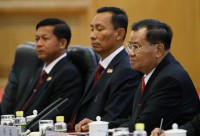
Written by Natasha Kieval, Programs Intern
In recent years, Burma has taken some steps towards a more liberal government: opposition leader Aung San Suu Kyi was released from prison and elected to parliament, press restrictions have been lifted, and new laws have been enacted to expand labor rights and eliminate the use of child soldiers. Though these steps are criticized for being incomplete or ignored, President Sein has said that Burma cannot be expected to be more democratic yet as it is a work in progress. In light of these reforms, in the past 2 years the US government has eased its sanctions on Burma, including those on 4 major Burmese banks. However, many believe that the US has moved too quickly in removing these sanctions, instead believing that the US should use its leverage to persuade the Burmese government to reduce its violence.
Burma’s continued conflict between its various ethnic groups and the military government has resulted in a horrifying humanitarian crisis. According to the US Campaign for Burma, the government has used “forced labor, forced displacement, sexual violence, and executions” to eliminate opposition. Of the 30 armed ethnic groups in the country, some have signed ceasefire agreements with the government, though there have been calls for a national dialogue to solve these issues. The national army has also broken a ceasefire agreement with the Kachin people.
Last week, the Wilson Center hosted a delegation from the Pyidaungsu Hluttaw, the bicameral Burmese parliament. Among the delegates was Shwe Mann, the speaker of the Pyithu Hluttaw, the lower house. Mann spoke about his interest in learning from the United States about ideas of power sharing. However, when he was asked directly about the 2008 constitution and its provisions that protect military power, his response was simply that it is being reviewed. The 2008 constitution requires that 25% of the parliament to automatically be held by the military, and all presidents of Burma must have military experience. The ongoing power of the military in the Burmese government is widely criticized, and Mann avoided the question. Other issues that were brought up during the question and answer session included land confiscation by the government, a two child policy for Rohingya Muslims, and ethnic separation. Mann, who fielded the majority of the questions, demonstrated his skill in avoiding addressing these issues, repeating the words “we are reviewing” several times.
It is clear that Burma has a long road ahead as it works towards a more inclusive government. However, not all news from Burma is negative. President Sein has made significant efforts to liberalize the country, which has generated hope for a more democratic Burma among the international community, the US government, Burma watchers, and more. Mann also spoke of a women’s protection law that is being discussed, which would be a step in the right direction. If you are interested in learning more about Burma’s current political situation, check out this New York Times article and the US Campaign for Burma.
